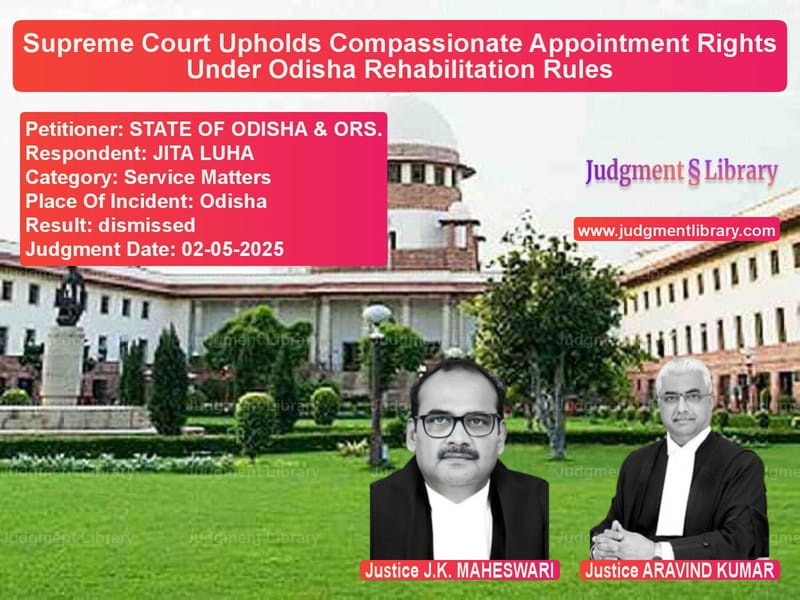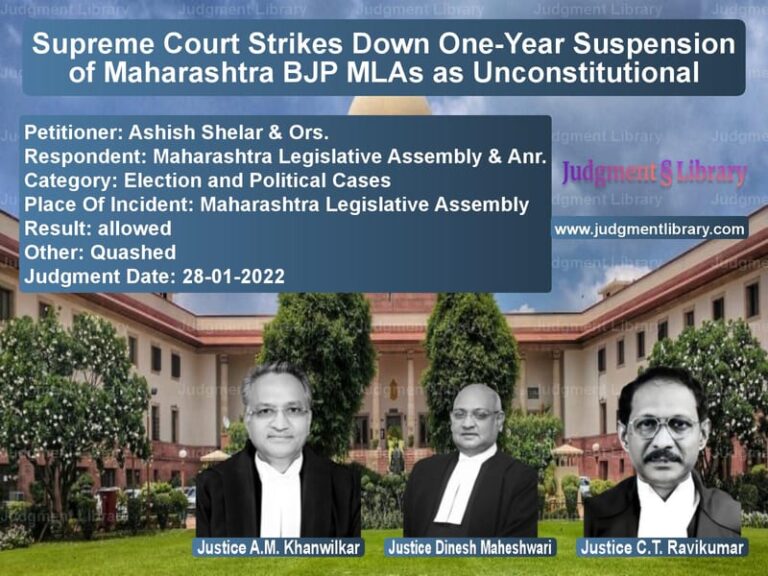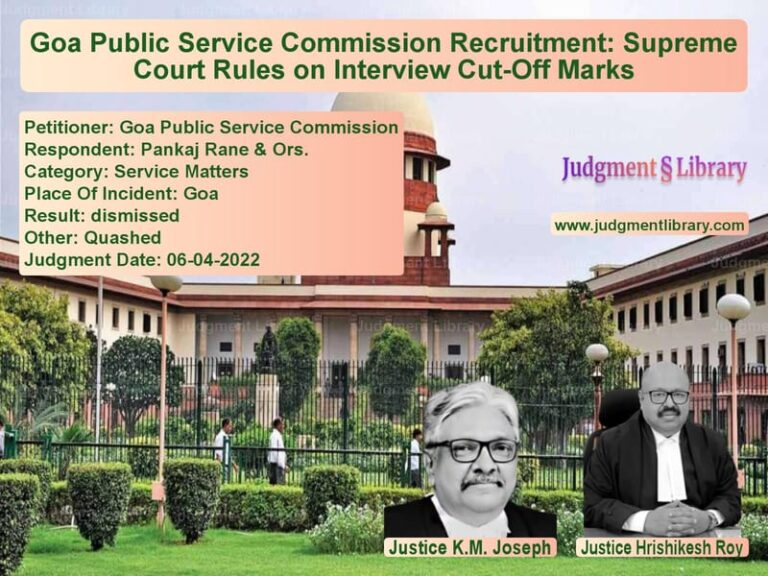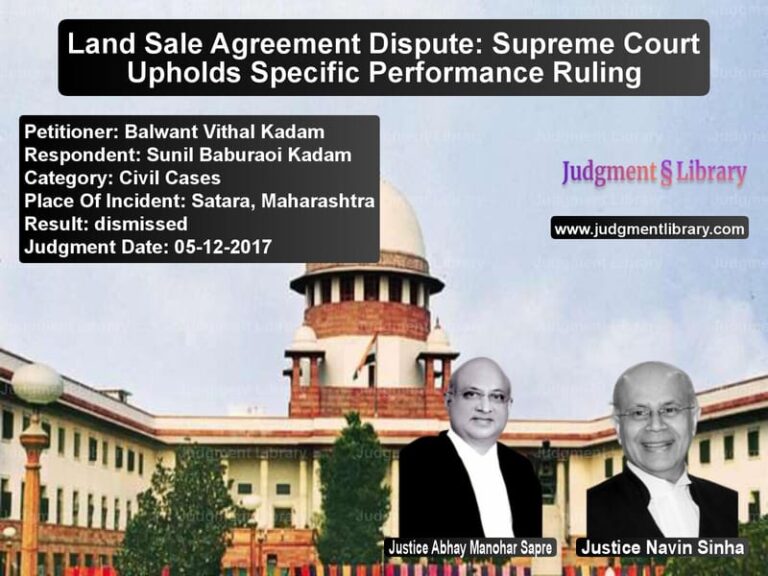Supreme Court Upholds Compassionate Appointment Rights Under Odisha Rehabilitation Rules
In a landmark judgment that brings relief to hundreds of families of deceased government employees in Odisha, the Supreme Court has delivered a crucial verdict upholding the rights of dependents to compassionate appointments under the state’s rehabilitation assistance scheme. The case, which involved a massive batch of 6175 civil appeals, centered around the fundamental question of whether compassionate appointments should be governed by the rules prevalent at the time of the employee’s death or by subsequent amendments that might restrict these benefits.
The legal battle began when numerous dependents of deceased government employees approached the courts seeking appointment on compassionate grounds under the Odisha Civil Services (Rehabilitation Assistance) Rules, 1990. These applications had been pending for years, and the state government’s attempt to apply the newer 2020 rules to these cases created widespread uncertainty and anxiety among the affected families who were already grappling with the loss of their primary breadwinners.
The Legal Framework and Its Evolution
The Odisha Civil Services (Rehabilitation Assistance) Rules, 1990 were established as a welfare measure to provide immediate relief to families of government employees who died in harness. The Supreme Court noted that “The notification dated 13th September 1990 was issued in exercise of powers conferred by the proviso to Article 309 of the Constitution of India and the State Government through Governor made the 1990 rules to regulate recruitment to the state civil services and posts as a measure of rehabilitation assistance.”
Under these rules, the family members of deceased employees could apply for compassionate appointments to help them overcome the sudden financial crisis caused by the loss of their primary earner. The process involved submitting an application to the appointing authority, followed by a report from the District Collector to ascertain whether the family was in genuine financial distress.
The controversy emerged when the state government introduced the Odisha Civil Services (Rehabilitation Assistance) Rules, 2020 on February 17, 2020, which contained Rule 6(9) stating that “the pending cases as on the date of publication of these rules shall be dealt with in accordance with provision of 2020 rules.” This meant that even cases where employees had died much earlier, under the regime of the 1990 rules, would now be evaluated according to the new, potentially more restrictive criteria.
The High Court’s Intervention
When the affected families challenged this approach through writ petitions, the High Court of Orissa at Cuttack delivered a significant judgment on June 27, 2023. The High Court directed that “the application for the petitioners shall be considered under the Odisha Civil Services (Rehabilitation Assistance) Rules, 1990 in as much as on scrutiny, it is found that all the applications were filed before 17.02.2020 and the delay in considering the applications in time is entirely attributable to the opposite parties.”
The High Court made it clear that “the date of death of the deceased employee would be relevant factor and the case of the respondents shall be considered applying the 1990 rules and not as per 2020 rules.” However, the court also clarified that “the petitioner does not have any vested right of appointment under such rehabilitation assistance/appointment scheme. They are only entitled to be considered under the scheme for that purpose.”
Read also: https://judgmentlibrary.com/supreme-court-upholds-teachers-appointment-in-caste-category-dispute/
The Supreme Court’s Deliberation
The state government appealed the High Court’s decision before the Supreme Court, leading to the constitution of a special bench to handle this massive batch of cases. During the proceedings, a significant development occurred when the state government itself recognized the merit in the High Court’s approach and decided to amend the rules accordingly.
The Supreme Court bench comprising Justice J.K. Maheshwari and Justice Aravind Kumar noted that “Learned Advocate General appearing for the State of Odisha has produced Notification dated 04.04.2025 making amendment in sub-Rule 9(a) of Rule 6 of the Odisha Civil Services (Rehabilitation Assistance) Rules, 2020.”
The Court recorded the state government’s position that “It is stated before us that except the cases covered by the block grants Schools and Colleges, all other cases would be governed by these Rules and the Government is benevolent to extend the benefit of rehabilitation assistance to them; therefore, the amendment has been brought into the Rules.”
The 2025 Amendment Rules
The newly introduced Odisha Civil Services (Rehabilitation Assistance) Amendment Rules, 2025 brought crucial clarity to the situation. The amended Rule 6(9) now explicitly states that “All pending applications, relating to death of Government employee prior to the date of commencement of the Odisha Civil Services (Rehabilitation Assistance) Rules, 2020 shall be dealt in accordance with the rules prevailing on the date of death of Government employee for appointment under Rehabilitation Assistance Scheme.”
The amendment further elaborates that “In case the death of Government employee occurred on or after commencement of the Odisha Civil Service (Rehabilitation Assistance) Amendment Rules, 2016 and before commencement of the Odisha Civil Services (Rehabilitation Assistance) Rules, 2020, shall be governed by the provisions of the Odisha Civil Service (Rehabilitation Assistance) Rules, 1990.”
For cases where employees died before the 2016 amendments, the rules specify that they “shall be dealt on the basis of distress certificate available in the existing or original application as per the Odisha Civil Service (Rehabilitation Assistance) Rules, 1990.”
The Supreme Court’s Final Directions
After considering the amended rules and the submissions from both sides, the Supreme Court concluded that “in our view, the directions issued in the order impugned finds force from the amended rules notified on 04.04.2025 referred above. Therefore, we are inclined to maintain the order of the High Court.”
The Court issued comprehensive directions to ensure smooth implementation:
“(i) The respondents are at liberty to submit an application, if not already submitted, within a period of twelve weeks, to the jurisdictional authorities along with requisite documents as specified in the notification dated 04.04.2025.
(ii) In the cases where application has already been submitted and any additional documents are required to be submitted, the same be furnished to the authority in reference to their pending application or in reference to the demand, made by the authority if any, within the same period of twelve weeks.
(iii) On receiving the applications as mentioned above, the appropriate authority shall examine the cases of individual respondent in terms of the 2025 amended rules and pass appropriate order. It is needless to say that the applications, so filed, shall not be rejected on technical grounds and shall be considered sympathetically strictly in accordance with the Rules.
(iv) In case the post is available, the competent authority shall pass an order of appointment, otherwise the procedure as prescribed in the relevant rules shall be followed and thereafter the respondents be permitted to join their duties within the time specified.”
The Court also protected the interests of those who had already received appointments, clarifying that “the appointment already granted by the Government extending the benefit of Rehabilitation Assistance Scheme shall remain unaffected by the directions as contained hereinabove.”
Broader Implications and Significance
This judgment represents a significant victory for the principles of compassionate appointment and social welfare. By upholding that the rules prevalent at the time of the employee’s death should govern the compassionate appointment process, the Supreme Court has ensured that thousands of families across Odisha will receive the benefits they were originally entitled to.
The Court’s approach reflects a deep understanding of the purpose behind compassionate appointment schemes – to provide immediate relief to families suddenly thrust into financial distress due to the untimely death of their earning member. By preventing retrospective application of stricter rules, the judiciary has protected the legitimate expectations of these vulnerable families.
The judgment also demonstrates the constructive role that courts can play in facilitating dialogue between citizens and the government. The state government’s decision to amend the rules during the pendency of the appeals shows how judicial proceedings can sometimes lead to administrative reforms that benefit all stakeholders.
For the numerous families awaiting compassionate appointments, this judgment brings much-needed clarity and hope. The twelve-week timeline for submitting applications and the direction that cases should not be rejected on technical grounds will help expedite the process and reduce further suffering.
This case also sets an important precedent for similar compassionate appointment schemes across different states, emphasizing that welfare measures should be implemented in a manner that genuinely serves their intended purpose of providing timely support to families in distress.
The Supreme Court’s balanced approach – maintaining the High Court’s directions while incorporating the state government’s amended rules – shows how judicial resolution can harmonize competing interests while keeping the welfare of citizens at the forefront.
Petitioner Name: STATE OF ODISHA & ORS..Respondent Name: JITA LUHA.Judgment By: Justice J.K. MAHESWARI, Justice ARAVIND KUMAR.Place Of Incident: Odisha.Judgment Date: 02-05-2025.Result: dismissed.
Don’t miss out on the full details! Download the complete judgment in PDF format below and gain valuable insights instantly!
Download Judgment: state-of-odisha-&-or-vs-jita-luha-supreme-court-of-india-judgment-dated-02-05-2025.pdf
Directly Download Judgment: Directly download this Judgment
See all petitions in Employment Disputes
See all petitions in Public Sector Employees
See all petitions in Recruitment Policies
See all petitions in Pension and Gratuity
See all petitions in Judgment by J.K. Maheshwari
See all petitions in Judgment by Aravind Kumar
See all petitions in dismissed
See all petitions in supreme court of India judgments May 2025
See all petitions in 2025 judgments
See all posts in Service Matters Category
See all allowed petitions in Service Matters Category
See all Dismissed petitions in Service Matters Category
See all partially allowed petitions in Service Matters Category







